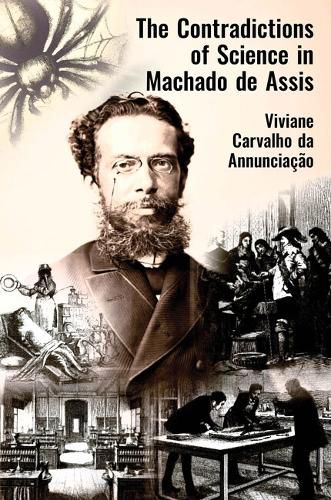Readings Newsletter
Become a Readings Member to make your shopping experience even easier.
Sign in or sign up for free!
You’re not far away from qualifying for FREE standard shipping within Australia
You’ve qualified for FREE standard shipping within Australia
The cart is loading…






This book explores the role of science in the short stories of Machado de Assis, focusing on works such as 'O Alienista' (1882), 'A Serenissima Republica' (1882), and 'Ideias de Canario' (1899). It examines how Machado uses scientific theories as literary and sociological devices to critique modern state institutions, including hospitals, prisons and government-sponsored medical projects. His scepticism extends to the liberal and politically independent scientific discourse of late nineteenth-century Brazil, a period of profound political, economic and social change.
By questioning the idealized figure of the rational scientist, Machado exposes the racial and economic hierarchies upheld by the dominant intelligentsia. Madness, egocentrism and the use of fantastic elements-such as talking animals and absurd situations-engage with the ancient tradition of the fable to highlight social tensions. The result is an ethically charged poetics of unreason, shaped by an ironic scepticism toward Romantic nationalism, literary naturalism, and scientific positivism, particularly in relation to race, gender, class, and nationality.
Perfect for scholars of literature, history, and cultural studies, this book reinterprets Machado de Assis as a radical thinker whose fiction offers a penetrating critique of race, gender and class in the making of modern Brazil. It can also serve as an initial study for many interdisciplinary interpretations of his work, opening new perspectives on his engagement with science and politics.
$9.00 standard shipping within Australia
FREE standard shipping within Australia for orders over $100.00
Express & International shipping calculated at checkout
Stock availability can be subject to change without notice. We recommend calling the shop or contacting our online team to check availability of low stock items. Please see our Shopping Online page for more details.
This book explores the role of science in the short stories of Machado de Assis, focusing on works such as 'O Alienista' (1882), 'A Serenissima Republica' (1882), and 'Ideias de Canario' (1899). It examines how Machado uses scientific theories as literary and sociological devices to critique modern state institutions, including hospitals, prisons and government-sponsored medical projects. His scepticism extends to the liberal and politically independent scientific discourse of late nineteenth-century Brazil, a period of profound political, economic and social change.
By questioning the idealized figure of the rational scientist, Machado exposes the racial and economic hierarchies upheld by the dominant intelligentsia. Madness, egocentrism and the use of fantastic elements-such as talking animals and absurd situations-engage with the ancient tradition of the fable to highlight social tensions. The result is an ethically charged poetics of unreason, shaped by an ironic scepticism toward Romantic nationalism, literary naturalism, and scientific positivism, particularly in relation to race, gender, class, and nationality.
Perfect for scholars of literature, history, and cultural studies, this book reinterprets Machado de Assis as a radical thinker whose fiction offers a penetrating critique of race, gender and class in the making of modern Brazil. It can also serve as an initial study for many interdisciplinary interpretations of his work, opening new perspectives on his engagement with science and politics.